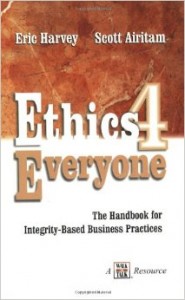![]()
Are you faced with an ethical dilemma? Work through this handy checklist from CRMlearning based on “Ethics 4 Everyone” by Eric Harvey and Scott Airitam.
Before you take action, ask yourself…
- Is it legal?
- Does it comply with our rules and regulations?
- Is it consistent with our organizational values?
- Will I be guilt-free if I do it?
- Does it match our stated commitments?
- Would the most ethical person I know do it?
- Would I do it to my family or friends?
- Would I feel ok if someone did it to me?
Are you facing a decision between conflicting rights?
For example, it is right to do your best work on each assigned task, but it is also right to meet assigned deadlines. So do you cut corners to meet the deadline? Or give it your all and miss the due date?
First try to eliminate the conflict by seeking permission to grant an exception. In my example above, maybe you would ask your supervisor to extend the deadline or to determine if your work in its current state meets the minimum requirements to achieve the desired outcome.
This, of course, is a simplified example, and often the decision is not so easy. Therefore, when you face a difficult decision between conflicting rights, ask yourself which of the conflicting rights…
- Is most in line with laws, regulations, and organizational procedures?
- Is most in line with organizational values?
- Establishes the best precedent for guiding similar decisions in the future?
Have any tips for how you handle ethical dilemmas?
Christine McMahon is part of the GovLoop Featured Blogger program, where we feature blog posts by government voices from all across the country (and world!). To see more Featured Blogger posts, click here.






Great post! When it comes to ethics there isn’t always a right or wrong, sometimes there are grey areas. It’s important to check with a co-worker or boss before doing something you’re unsure about.
I love this post. I think sometimes we lose sight of ethics in the workplace and it’s always nice to get a reminder on how to handle ethical issues when they arise.
I suggest referring to the American Society of Public Administration code of ethics. See http://www.aspanet.org/public/ASPA/About_ASPA/Code_of_Ethics/ASPA/Resources/Code_of_Ethics/Code_of_Ethics1.aspx?hkey=222cd7a5-3997-425a-8a12-5284f81046a8. Many discipline professional societies and accreditation entities — finance, planning, law, engineering, medicine — have their own codes of ethics and some have study examples or even people who will consult on issues.